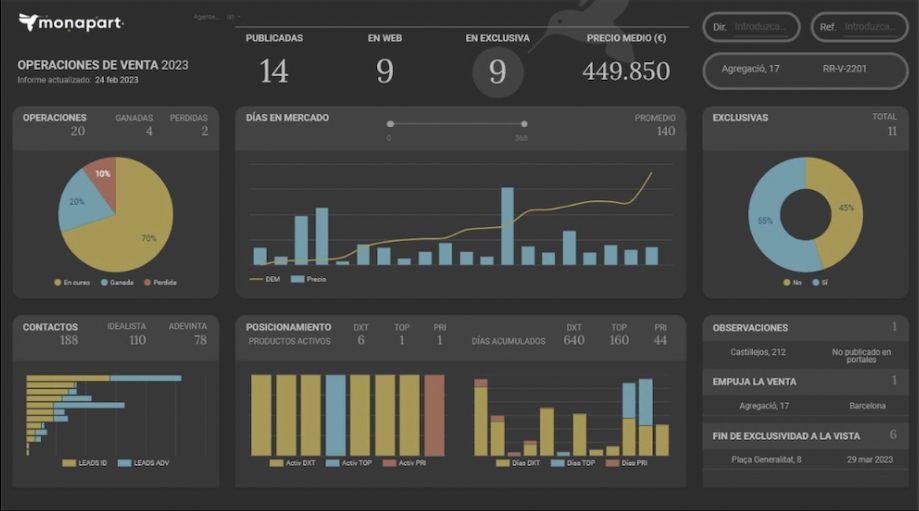Attracting and selling housing in bad times
How global uncertainty, changes in the Euribor and labour market dynamics impact both buyers and sellers.

This analysis is essential for real estate professionals looking to adapt and thrive in these uncertain times.
Identifying an adverse real estate market: the news
There are phenomena that are common, causal I would say, in adverse times for the real estate sector (and for other sectors as well). The clearest for me are:
- Uncertainty affects housing supply and demand. Not knowing what is going to happen paralyses important decisions. Geopolitical conflicts, social tensions, regulatory changes... affect both sellers and buyers. A BBVA analysis suggests that house prices could continue to rise in 2024.
- The impact of the rise in the Euribor affects housing demand: if the price of money rises, the interest payable on a loan rises, the mortgage payment rises and the purchasing power of buyers is reduced. This scenario, where housing becomes prohibitively expensiveis increasingly common.
- An unstable labour market affects housing demand: if unemployment rises or temporary jobs prevail, there is less confidence in future income and therefore people's ability to commit to mortgages decreases, either out of prudence or because the bank will not finance them.
Any one of these factors separately affects housing demand and/or supply. If two coincide, worse; if three coincide, "more worse".
"Uncertainty, rising interest rates and job instability affect housing supply and demand."
Identifying your challenges as a real estate agent
Now let's look at how these macroeconomic phenomena affect consumers' decisions and how you notice it in your day-to-day work as a real estate agent:
1. Your referrers refer fewer opportunities to you
In adverse times for the real estate sector, there are fewer transactions and prices fall; or there is the current anomaly in which sales fall, but not prices (according to Expansión, we are heading towards a 2024 dynamic and rising prices).
There are fewer buyers, but also fewer sellers, who will wait for prices to rise before coming back on the market. Moreover, as the number of agents falls more slowly than the number of sales, for a period of time - one year? two years? - more agents will be "tapped" for each saleable property.
The sum of these two factors means that your regular referrers have fewer seller leads to offer you and, unless they are exclusive referrers, they have the same old agents to refer those dwindling leads to.
2. More follow-up time for undecided prospects
OK, let's say you have a landlord contact, a prospect. If you are trying to capture a property in adverse times for the real estate sector you will come across undecided homeowners who are hesitant:
- The time to go on sale. When is the best time to sell a property?
- The price at which it is offered for sale, which will often be unrealistic.
- The most advantageous way to sell; the owner will compare and negotiate a lot with two, three or more agencies.
He also believes that an owner considering selling in this turbulent context will do so for two reasons:
a) It has a pressing economic need, so much so that it sells when it is not optimal to do so.
b) You need to move house, you can't wait too long and, if necessary, you must sell to be able to buy.
In both cases you will be faced with owners who are overwhelmed and insecure because they are forced to sell at an inauspicious time, and this leads to stressful situations and hasty sales decisions. It will cost.
3. You compete with more agents for each recruitment
If you move it closer to the time of service introduction, particularly in the months or years of cycle change, you are going to find more competitors (and more desperate to recruit) in every potential recruitment you have.
To meet this challenge, it is crucial that you boost your personal brand as an agent with effective real estate marketing strategies that will help you stand out and differentiate you from your competitors.
4. You receive more objections during presentations
In a scenario of fewer sales and less supply, few homeowners will thank you for working at risk to sell their property; more likely they will expect you to thank them for "allowing" you to sell.
As it is, owners will act as if they have a precious commodity with many suitors increasingly willing to make concessions on the starting price and on the price, duration and conditions of service.
5. Increased service costs and fee compression
Selling a home in adverse times for the real estate sector requires, of course, more and better resources and more sophisticated marketing strategies.
You will need the property for sale to compete better with its market equivalents. You need it to look better, more often, before the others; you need it to create a good first impression, to live up to its price - or look cheap! You need to put it before the eyes of those who are actively looking and before the eyes of those who might be interested if they come across it without expecting it...
You will say all of this - and it will be true - at every acquisition to justify the fee you think is fair to compensate you for the time, talent and money invested. And time and time again the owner will tell you that the agent who has preceded you that day in his round of meetings is offering him the same as you, one, two or three percentage points below what you think you deserve. It will happen.
6. Shorter exclusives and longer sales
Any rational homeowner willing to give an exclusive will think that in this difficult property market context, a property is worth less tomorrow than it is today, that if they get the wrong agency and agree a long exclusive, they will see their property drop in price month by month without being able to do much about it (or they will. Let's not go into the rights of homeowners in this post, which they have).
And yet he will also know - you will have told him - that the selling times will be longer, that the final offer will take longer to arrive, that he may even reject a first offer that months later he wishes he had accepted... All in all, you must be prepared to sign shorter exclusives, because an owner's fear of being "trapped" by a bad exclusive is too important to avoid.

In conclusion, these are the usual challenges in capturing and selling a housing in adverse times for the real estate sector. It is crucial to be attentive to market signals, indicators (for a broader view, read this Idealista's forecast analysis for 2024), newspapers, blogs, industry conferences... Then, little by little, in a tangible and concrete way, you will see how this news has permeated the consumer and their purchasing decisions.
Are you ready to face these challenges?






